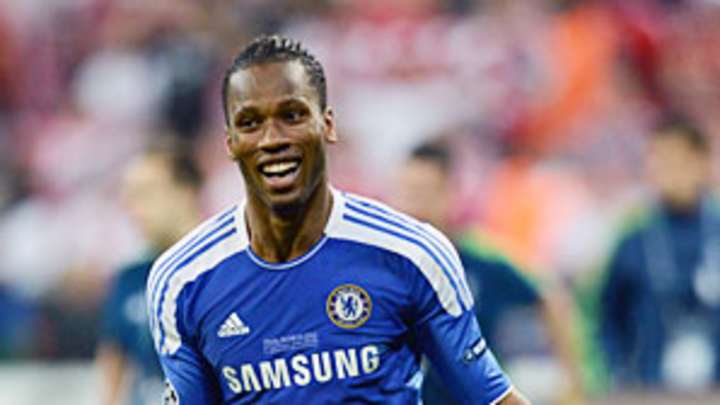Drogba looks to bolster soccer in Shanghai both on and off the field

A year or two ago, Didier Drogba -- interested in a change of scenery -- might have been tempted by the delights of North America and MLS. In June, however, he decided that the Chinese Super League was a more attractive option. Drogba decided to join the Shanghai Shenhua, and while Thierry Henry's subway trip to play for the New York Red Bulls made for a great story, Drogba can now take the 270 mph Maglev train to practice.
There are few cities that can match New York's dynamism, but Shanghai is one of them. Twenty-three million people are packed into China's gleaming commercial and business powerhouse, but few are into the local soccer scene in a significant way. China has the potential to emerge as a serious football hub, but currently, it's a bit of a mess. Chinese clubs may be able to outspend their MLS counterparts, but off the pitch, they have a ways to go.
As old NASL hands know, big stars don't always contribute to the long-term health of the game -- but they are certainly exciting and few are bigger than Drogba. The striker could play for almost any starting eleven in the world. And his last act for Chelsea was nothing short of magnificent: He knocked home a penalty that gave the London club a European championship.
Now his goal is different. Drogba's first mission for Shenhua is to try to help them avoid relegation to China's second tier. His plane is expected to touch down at Pudong Airport on Saturday morning and he'll likely fight his way through a horde of reporters. He will be under no illusions at the size of the task ahead of him.
Just over 12 hours later, Drogba should arrive in Hongkou Stadium. Typically less than 15,000 spectators would be in attendance, but Saturday will presumably be different -- and not just because of the Ivorian's presence. Bitter rival Beijing Guoan will be in town. The Green Lions would love nothing more than to spoil Drogba's welcome party and hasten Shenhua's slide to the bottom of the standings. At the moment, with the midway point of the season approaching, the distance between Drogba's new team and last place is a mere one point.
Few would have thought that such a situation was possible when news broke in December that Nicolas Anelka, Drogba's former Chelsea teammate, was headed to Shanghai. In soccer terms, Guangzhou had become the foremost Chinese city, the one grabbing the headlines and stars. The Cantonese team won the 2011 league title behind Argentinian Dario Conca, who reportedly became the third-highest paid player in the world in July. In a span of just over 18 months, the team spent more than $50 million. Other Chinese clubs started to follow suit.
Shanghai was an exception, though. Under online gaming tycoon Zhu Jun, who took control of the club in 2007, money seemed to be running out. Players were being sold, the average attendance hovered around 10,000 and the team finished in the middle of the pack. Naturally, then, reports that Anelka was headed to the Shenhua were initially dismissed.
In fact, nobody is still certain where the money came from. It could have originated from Zhu's new game "Firefall", the city lending a helping hand or more businessmen joining the burgeoning trend of investing in soccer. Much of the money flowing into the game has a political flavor, according to the country's leading soccer writer, Ma Dexing. "Some of the next generation of leaders (including Xi Jinping) like soccer, so some businessmen want to invest to make the leaders happy," said Ma. "It's nothing to do with soccer itself. It's hard to say whether this is good or bad for China."
It's good for the respective bank accounts of Drogba and Anelka, though, which swell by a combined total of more than $600,000 every week. And for that, the former Chelsea standouts have to occasionally play with the boss. Zhu picked himself to participate in an exhibition against Liverpool and played alongside Anelka in a recent friendly. He declared in an interview with Financial Times that he plans to do the same with Drogba. "I think many rich people will be jealous when they see me playing football with professional players," Zhu said. "They won't be able to see their stiff legs working in a football match."
The attention on Drogba should also take some of the pressure off Anelka, who has been struggling as of late. Fans and media are starting to ask questions of their superstar striker. Anelka's failure to follow local custom and bow to the traveling Blue Devils after a recent 1-0 loss to bottom club Qingdao wouldn't have mattered nearly as much if he had scored more than just two goals in 12 games.
The constant chaos on the sidelines doesn't help. Jean Tigana lasted just weeks before being fired, and, as confusion reigned, it was even reported that Anelka had accepted the coaching job. At the next home match, the bench was void of a coaching staff, with just medical personnel and substitutes on the sidelines. Former Argentina coach Sergio Batista is now in charge, but at Shanghai, that's a relative term.
"The world has so many coaches," said Zhu. "It is not abnormal we change two coaches in one year as we do not have any long-term plan. We're different from Europe."
That last sentiment is clear. The Chinese Super League is vastly different than North America, too, but for the moment at least, it's gaining in popularity. More superstars are coming and more money is pouring in. When fans talk about leagues outside Europe, China is beginning to be mentioned more and more.
